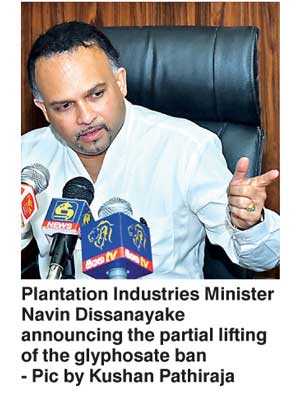Wednesday Feb 25, 2026
Wednesday Feb 25, 2026
Thursday, 3 May 2018 00:00 - - {{hitsCtrl.values.hits}}
By Charumini de Silva
After many months of lobbying, the Government yesterday lifted the glyphosate ban for tea and rubber, paving the way for the industry to gain an estimated Rs. 20 billion in revenue and removing a possible threat of a Japanese ban on Ceylon Tea exports. 
“Following extensive discussions with many stakeholders and Cabinet Ministers, the President and Prime Minister have decided to lift the ban on glyphosate. But only for tea and rubber,” Plantation Industries Minister Navin Dissanayake told reporters in Colombo.
The decision was made considering the massive economic cost and the importance of the two crops in generating much-needed foreign income to the country, Dissanayake outlined. Tea is Sri Lanka’s largest foreign exchange earning crop, accounting for about $ 1.5 billion annually. Sri Lanka produces about 300 million kilogrammes of tea each year.
“We are also planning to appoint a committee to issue licences to import glyphosate in the future. We know the amount of glyphosate that is required by the tea and rubber industries. In the future, we are planning to introduce a mechanism that will allow companies to bring glyphosate,” he told the Daily FT.
In 2015, President Maithripala Sirisena banned glyphosate fearing it was causing chronic kidney disease (CKD) after some researchers published a paper linking glyphosate to the disease, which is prevalent in the North Central Province of the country.
The National Economic Council (NEC) decided to lift the arbitrary ban imposed on glyphosate in March 2018, in light of overwhelming scientific consensus that the substance was not harmful to human health.
According to the Minister, the tea industry itself has incurred a loss of Rs. 26 billion per year due to the ban imposed on glyphosate.
The Minster is planning to submit a Cabinet paper to gain formal approval from the Cabinet next Tuesday regarding the lifting of the ban. However, the Minister says he is committed to practising the same principle of the European Union (EU) to find an organic and viable alternative for glyphosate within the next four years.
“The Tea Research Institute (TRI), in collaboration with the China Tea Research Institute, is now working on a formula to come up with an alternative weedicide that can be used for commercial agriculture,” he added.
In the absence of glyphosate weedicide, he said tea plantations turned to an alternative weedicide named MCPA. “Some producers have used MCPA instead of glyphosate and Japan has detected that the accepted level was exceeded. Japan actually warned us that they would take action in terms of a ban if this continued. There was never a problem like this when producers used glyphosate and it was well within the controlled limits. The shortsighted decision made by authorities in banning glyphosate in Sri Lanka could result in the loss of Japan as a major market for Ceylon Tea.”
He pointed out that there was a great threat to Ceylon Tea if Japan imposed a ban as other export markets would also follow suit.
Dissanayake expressed confidence that once producers were allowed to use glyphosate, the threat of Japan imposing a ban on Ceylon Tea would no longer exist.
The Minister charged that the imposition of the ban on glyphosate created unnecessary problems, especially for the tea industry, which contributes significantly to the national economy through foreign exchange earnings.
“This ban has caused extensive damage to plantation companies, planters and the agricultural economy of Sri Lanka,” he added.
The Minister commended the solitary struggle the tea industry carried out to get the ban lifted for the benefit of all stakeholders.
He denied all allegations that glyphosate had a link to CKD, insisting that most of these research papers were just “hypotheses” and possessed no scientific basis.